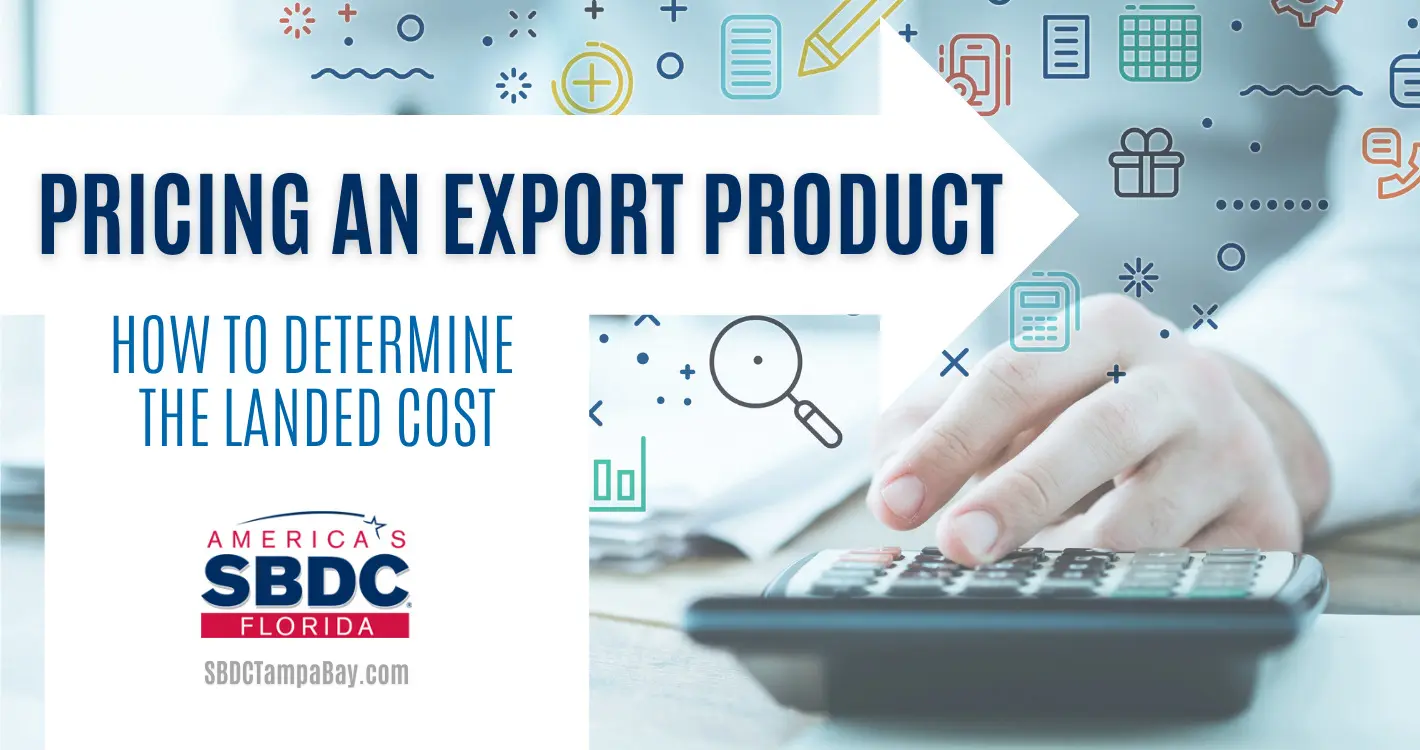Determining the Landed Cost when Exporting

by Selma Canas, CGBP | November 21, 2022
To be competitive in a foreign market, sellers need a good pricing strategy. In order to determine a competitive price, all costs associated with the product and delivery to buyer need to be calculated. This is the landed cost of an export shipment and is critical when pricing an export product.
Sellers need to have good dialogue with their customer and freight forwarder to have a comprehensive understanding of the final price to the consumer. The customer can provide information on duties, taxes, and other fees associated with imports to their country. The forwarder can provide quotes on freight transportation and insurance, as well as, assist with determining the harmonized system code (HS) to use. The HS code determines the import duty of a product in the destination country.
Sellers also need to have a good understanding of the Incoterms® 2020. These are international commercial terms, having precise meanings for the sale of goods around the world. These codes are the sales terms negotiated between the seller and buyer. The code used will determine which party is responsible for the cost, the location of the goods, and at which point the responsibility shifts from the seller to the buyer. There are 11 incoterms ranging from zero cost and responsibility to the seller to all costs and responsibility to the seller.
An example of zero cost to the seller would be EXW – Ex Works (Seller Warehouse).
The goods will be located at the seller’s warehouse ready for pick up by the buyer. The landed cost in this example would be the invoice amount of the cost of goods. The buyer is then responsible for the goods from that point on.
An example of all costs and responsibility to the seller would be DDP – Delivered Duty Paid (Destination Country).
The goods will be located in the destination country ready for pick up by the buyer. The landed cost will now include the invoice amount of the cost of goods plus transportation, freight, insurance, import duties and taxes, to be borne by the seller. The seller is responsible for the goods until the buyer takes possession.
Regardless of which party is paying for freight charges and import duties, they will still need to be paid and the seller needs to know what these costs will be in order to determine a competitive price.
Transportation costs may include delivery of goods to port of departure, to a place designated by the buyer, or a place in the destination country. Freight charges may include loading onto a ship and unloading at the destination, shipping to a destination, and cargo insurance. Sellers can obtain quotes from freight forwarders for all of these charges.
Sellers can look up import duties and taxes by country using the Tariff Lookup Tool. For example, a gear box with HS code 870840 to India has a duty rate of 15 percent plus a 10 percent tax and an 18 percent value-added tax (VAT). In most cases, the seller does not pay duty and taxes, but knowing these amounts can help greatly when pricing the product for sale in a foreign market, keeping in mind that local competitors do not incur import duties.
Calculating the landed cost can help sellers avoid incorrectly pricing a product, which can have detrimental effects on the business. The price may be too low to cover all of the export costs or too high to compete with other products in the same market.
A best practice would be to calculate landed costs over time in order to identify ways to reduce exporting fees and improve profits.





Selma Canas
Canas, Consultants, International Consultants 2, TampaNASBITE Certified Global Business Professional (CGBP), Florida SBDC at USF, Tamp
Specialties: International Trade, Export Marketing Plans, Market Research
Selma Canas is responsible for guiding small businesses through the complexities of developing export marketing and international expansion plans and teaching seminars on basic international trade. She has developed more than 30 Export Marketing Plans during the past six years for local businesses, and participated in trade missions to Brazil, Chile, Canada, and the Dominican Republic. Canas has more than 15 years of experience in sales, marketing and customer service in a variety of industries, including freight forwarding, real estate and advertising. As a co-owner of Restaurant Guide USA, she increased sales and distribution points and tripled the size of the distributed product.
As a real estate broker-owner, Canas carved a niche in the Latin American community and had a career sales volume of more than $37 million. Canas earned her bachelor degree in economics from the University of South Florida. She is a NASBITE Certified Global Business Professional and holds an Export and Trade Counseling Certification from the U.S. Small Business Association. Selma earned Florida SBDC at USF Employee of the Year honors in 2016. She is a member of Toastmasters international and is fluent in Spanish and Portuguese.